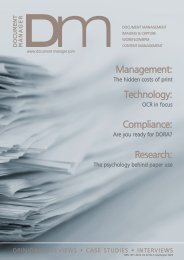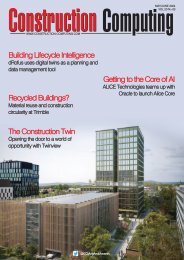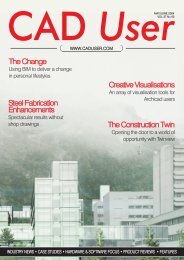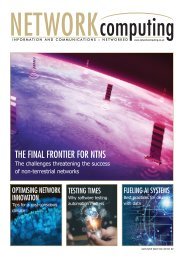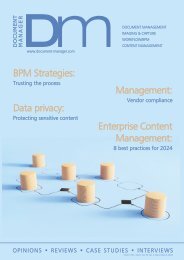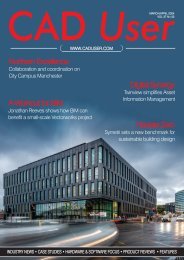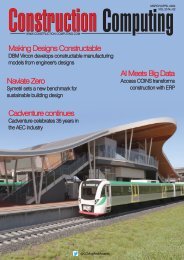NC Feb-Mar 2023
Create successful ePaper yourself
Turn your PDF publications into a flip-book with our unique Google optimized e-Paper software.
OPINION: MACHINE LEARNING<br />
within tightly<br />
defined boundaries,<br />
as any usage of resources<br />
also means an opportunity cost.<br />
Preferably, then, we would opt to solve all<br />
problems with rule-based approaches.<br />
However, that runs into other complicated<br />
issues, such as not all problems having<br />
defined boundaries that can be solved<br />
through rules.<br />
Machine learning is great at solving<br />
two types of challenges. Any problem<br />
that requires a probabilistic answer is<br />
likely much better done by a model<br />
rather than anything rule-based. Another<br />
area where machine learning is<br />
immensely valuable is when the rules are<br />
not clear.<br />
In business, we might sometimes not be<br />
sure on how to answer specific questions.<br />
For example, what rules should govern a<br />
self-checkout process? There are nearly<br />
infinite possibilities for structuring such a<br />
feature, but we're always looking to<br />
maximise the outcome. In other words,<br />
we'd prefer that a self-checkout would<br />
lead to the most conversions.<br />
INFERE<strong>NC</strong>ES FROM MACHINE<br />
LEARNING MODELS<br />
A common objection might be that some<br />
machine learning models, such as Deep<br />
Neural Networks, are essentially black<br />
boxes. We're never quite sure what's<br />
going on under the hood, so extracting<br />
rules from them is as much guesswork as<br />
without them. Fortunately, in business<br />
applications, we don't need to be as<br />
exact as logicians or scientists who<br />
attempt to uncover the foundational<br />
blocks of minds, language, or the<br />
universe. Insights that point us in the<br />
right direction are enough to create a<br />
case for doing things one way or<br />
another.<br />
In other words, when building a model<br />
that predicts the best outcome for a selfservice<br />
customer system, we're not trying<br />
to define some immutable laws of human<br />
behavior. We're simply looking at an<br />
admittedly ever-changing set of<br />
circumstances and attempting to wrestle<br />
out the best way to go about them.<br />
So, going back to the same example, a<br />
Random Forest algorithm, fed with<br />
enough data from event sessions and<br />
user activities, could outline the most<br />
predictive outputs. These would indicate<br />
what users are most influenced by during<br />
the self-service process. These outputs<br />
might not be ground-breaking or even<br />
wide-ranging as they only work in a fairly<br />
confined space of circumstances. But<br />
they're more than enough for the<br />
engineers, designers, and content writers<br />
to perform optimisation that would lead<br />
to better conversions.<br />
These insights can then be turned into<br />
rule-based algorithms. As such, machine<br />
learning models can give us a way to<br />
discover circumstantial rules that we can<br />
implement in our business practices.<br />
CO<strong>NC</strong>LUSION<br />
Hopes that machine learning will<br />
replace rule-based systems are illfounded.<br />
The latter is often much more<br />
efficient and cheaper to build and<br />
maintain than complicated machine<br />
learning models. As businesses are<br />
always turning one eye to efficiency,<br />
rule-based systems are here to stay.<br />
Machine learning, unlike commonly<br />
thought, can be used to supplement<br />
rule-based systems. While there are<br />
possible ways of combining one into a<br />
single system, the former can also be<br />
used to garner insights that can then be<br />
implemented into the latter.<br />
In the end, machine learning shouldn't<br />
be thought of as the cure-all for technical<br />
problems. It's one of the many possibilities<br />
that should be used thoughtfully. One of<br />
those is to ensure we make better<br />
decisions in other systems. <strong>NC</strong><br />
WWW.NETWORKCOMPUTING.CO.UK @<strong>NC</strong>MagAndAwards FEBRUARY/MARCH <strong>2023</strong> NETWORKcomputing 33




